The Komboucha-Project: How drinking tea can change our world
„Many small people, who in many small places, do many small things, can alter the face of the world“ (Anonymous)
First Attempt
The Komboucha-Project is a collaborative experiment in which our world is changed through individual actions.
What is Komboucha?
Komboucha is a special drink that is made by combining usual tea with a specific kind of bacteria.
By adding sugar this bacteria grows on the teas surface whereby it forms a mushroom-like tissue called „Scoby“.
In a simple procedure the Scoby can be reproduced and recultivated to brew another batch of Comboucha.
The procedure
The Comboucha-Project takes advantage of this simple reproduction method in order to reach a big amount of people,
to spread their ideas and to connect them among each other.
Everything begins with the implementation of a first brewing process.
After the corresponding Scoby is big enough it will be cut in four pieces and distributed to four different people
along with an online brewing manual.
These four people then grow their own Scoby to make one single batch of Comboucha.
The brewing process lasts for ten to fifteen days.
During that time the participants think of their contribution for changing society as they want it to evolve.
When the Comboucha is ready they record themselves confessing to their planned action before drinking the tea.
Drinking the tea is a symbolical act of finishing the brewing and the personal thinking process.
It is a kind of internalization act that proves the participants belief in his "vision of change".
The video of this little ceremony is then committed to the projects youtube channel.
Each of the participants now fully grown Scobys is then again cut in four pieces and given to four different peoples along with
the online brewing manual and everything starts from the beginning.
Network and Discourse
1)
Every participant gets in touch with a leftover of every previous brewing process.
Being reproduced and transferred to more and more people the Scoby gains and multiplies „memory of confession“.
This memory draws an invisible connection line between the participants and their "visions of change".
2)
Every participant contributes his ceremony video to the projects youtube channel.
Here people can discover and discuss each others ideas and beliefs.
The Projects Aim
It is said that big changes begin with small steps.
If that is true then we should think of individually feasible strategies for change and implement them on a personal level.
Thereby it is very important that we again become aware of our responsibility towards our environment and our own actions.
This reminder is what the Comboucha-Project tries to achieve.
It considers the believe that freedom of choice and the power of an individual act can be used to create an environment of change.
Further Progress
SCOBY, an assemblage of micro organisms, is the protagonist of several video messages:
Stage 1: "Introduction" (the viewer got a jar including a piece of Scoby and a youtube link)
SCOBY speaks (directly to the viewer) about different perspectives on "the world" and our everyday environment.
It encourages the viewer to cooperate for getting an insight in a different view on things.
Stage 2: "Getting Started" (the viewer replied to the message, he is now a participant)
SCOBY tells the participant how to grow a new Scoby body from the piece floating in the jar.
Stage 3: "Exercise 1"
SCOBY comes up with a series of exercises that shall increase the participants sensual awareness.
Stage 4: "Exercise 2"
SCOBY comes up with a series of exercises that shall increase the participants sensual awareness.
Stage 5: "Exercise 3"
SCOBY comes up with a series of exercises that shall increase the participants sensual awareness.
Stage 6: "Exercise 4"
SCOBY comes up with a series of exercises that shall increase the participants sensual awareness.
Stage 7: "Exercise 5"
SCOBY comes up with a series of exercises that shall increase the participants sensual awareness.
Stage 8: "Vision of Change"
Now the participant is prepared to take the last step.
He is asked to think of a specific vision of change for the next three days.
Stage 9: "Ceremony"
The participant has decided for a vision of change.
SCOBY introduces the procedure of a ceremony that will give the participant the ability to make his/her vision become reality.
In the end SCOBY finally explains the participant how to keep the project going.
(How to produce four new starter kits for a new circuit of the procedure - "back to stage 1.")
Exhibition
The BioArt exhibition in Berlin will include an excerpt of the whole process.
Part 1:
SCOBY appears on a screen and speaks directly to the viewer.
It talks about different perspectives on "the world" and our everyday environment.
The viewer is asked to participate, which means to join a 6 hours - collaboration with SCOBY.
Part 2:
SCOBY introduces the participant to three simple exercises.
These exercises are performed inside the exhibition space.
They invisibly enable the participants "sensitization mode".
This mode lasts for six hours.
Part 3:
The participant is now prepared to develop and apply a personal vision of change.
This has to be done within the next six hours - before the sensitization mode ends.
The applied vision of change should remain implemented for the longest time possible.
The participant documents his change and shares the picture/video/sound file online by tagging it with a specific # tag.
Everything will be set up on a table including a screen, headphones and a media player.
Besides that there will be a glass jar holding a piece of Scoby and some liquid.
Inspiration
- Christope Andre: Wer sich verändert, verändert die Welt
- Wikipedia: Hermann Cake
- Wikipedia: Age of Enlightenment
- How Quantum Mind States Create Better Decision Makers
- Instructables: How to brew your own Komboucha
- Olafur Eliasson: Dein Ausstellungsguide
Structure
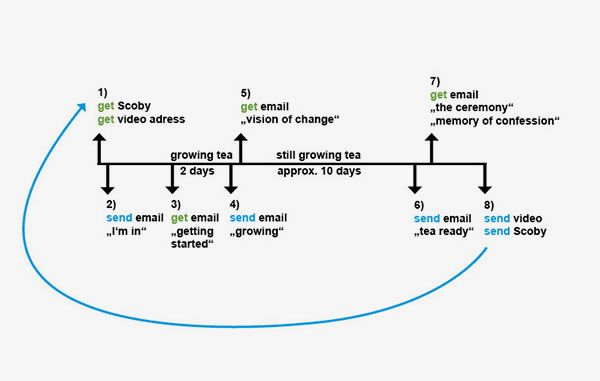
-> first attempt of setting up the procedure
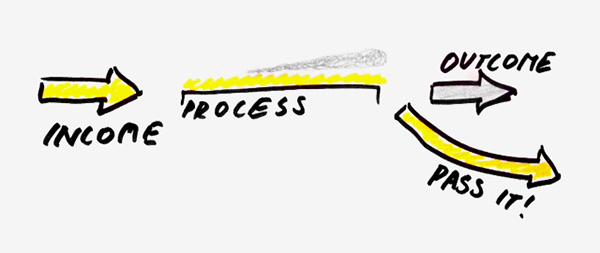
-> general idea of the procedure
sketches
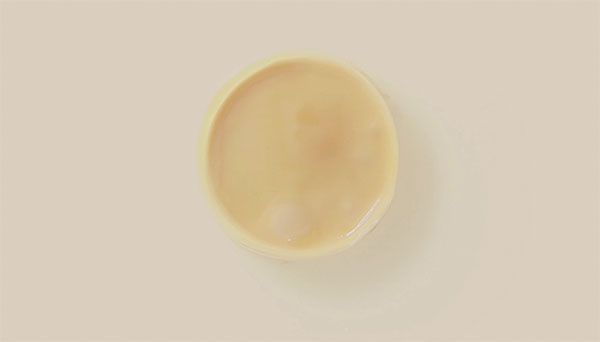
-> exhibition video
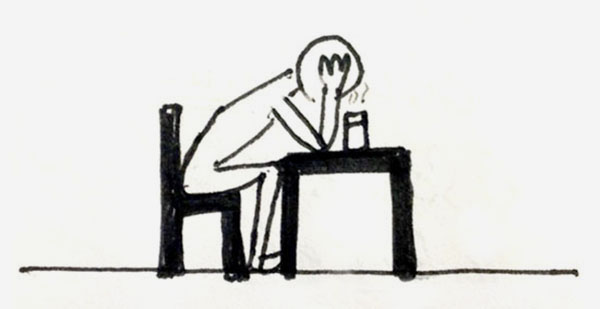
-> position for video 3 - 5
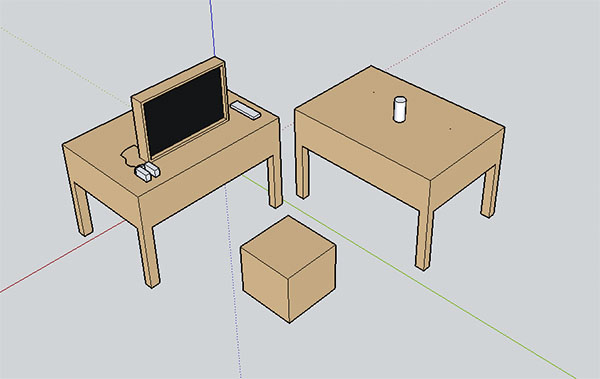
-> installation / exhibition
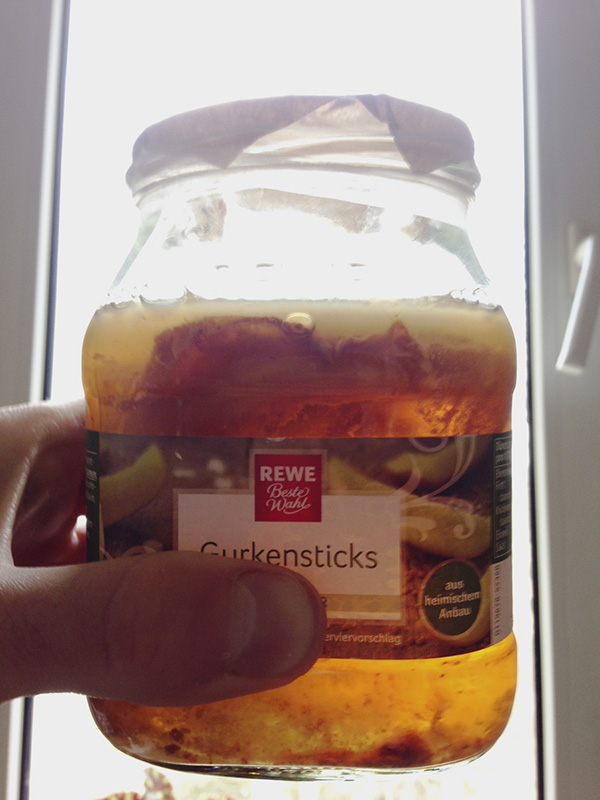
-> growing SCOBY for the exhibition